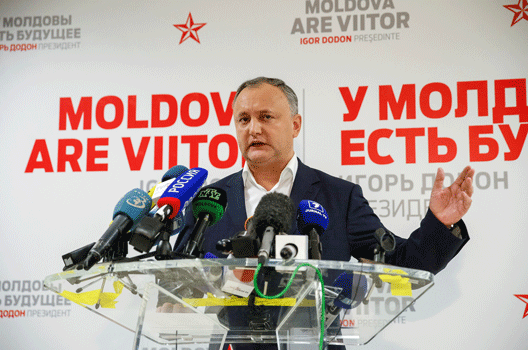 While not as globally consequential or shocking as the US presidential race, won by Donald Trump on November 8, the result of Moldova’s presidential runoff election does have significant ramifications for the future of democracy and economic reform in Eurasia.
While not as globally consequential or shocking as the US presidential race, won by Donald Trump on November 8, the result of Moldova’s presidential runoff election does have significant ramifications for the future of democracy and economic reform in Eurasia.
On November 13, Moldovans elected Socialist parliamentarian and former Economy Minister Igor Dodon as president with just over 52 percent of the vote over former Education Minister Maia Sandu who leads a new European-oriented political party called Action and Solidarity. This was the first direct election of the president since 1996. A constitutional court ruling in March struck down the previously implemented indirect election of presidents through Parliament.
Voter turnout on election day was modest—just over 53 percent. However, this seemed to reflect Moldovans’ general desire to move away from uninspired and corrupt leadership, as well as the economic stagnation that left Moldova with a negative gross domestic product growth in 2015.
Dodon is believed to be generally pro-Moscow. He opposes Moldova’s move toward European political and economic unification, and favors Moldovan membership in the Russian-dominated Eurasian Economic Union. He also seems to favor a federalized Moldova which, in essence, concedes the breakaway Transnistria region to either independence guaranteed by Russia, which comes with virtually no international recognition, or to outright Russian annexation.
In short, Dodon’s election represents a sharp turn from Moldova’s Western orientation that has developed over the last decade and a subsequent dependence on Russia’s declining economic model.
Yet, despite Dodon’s election over the Western-educated Sandu, Moldova’s direction is uncertain. Prime Minister Pavel Filip leads the pro-European minority government. How it cooperates with Dodon and his mandate will be determined in the coming months.
Moldova’s commitment to European integration was marked by a 2014 Association Agreement with the European Union (EU). Filip has claimed that direction is irreversible.
“This [agreement] includes key reforms needed for the country’s modernization and continued EU path, which cannot be reversed,” Filip said.
Dodon’s Party of Socialists wants to renege on the Association Agreement and Moldova’s trajectory toward the EU in favor of the Moscow-dominated Eurasian Economic Union. Latest survey research indicates there is a weariness of EU integration —31 percent of Moldovans in an October nationwide poll expressed support for full membership in the EU while 44 percent favor the Eurasian Economic Union.
Dodon, as the elected president and head of state, leads diplomatic negotiations for Moldova that could undermine Moldova’s turn toward the West and strengthen ties with Moscow.
How Dodon interacts with Filip’s pro-European government will be interesting. In the past, the Moldovan president—elected by a parliamentary majority—was on the same policy page as the prime minister who, under the previous constitutional interpretation, was appointed by the president. Now, Dodon—a pro-Moscow operative—and Filip—heading a minority government committed to European integration—must cooperate to turn economic growth in a positive direction and stem ongoing emigration from Moldova.
The next parliamentary elections are scheduled for November 2018, unless there are early elections. Given that the current Filip-led government is a minority government of Democrats and Liberals, with just thirty-three seats in the 101-seat Parliament, early elections are not out of the question if there is effective obstruction by the opposition Socialists, Party of Communists, and Liberal Democrats who collectively control forty-one seats. Twenty-seven members of parliament (MPs) are “non-aligned,” and will not shift the balance of power in parliament.
For Filip to govern effectively alongside an ideological opponent while keeping Moldova on a European trajectory, he must earn back the trust of Moldova’s citizens. Moldova’s pro-European political parties and candidates lost credibility because they are perceived—in part, correctly—as corrupt. They were the politicians in power when about $1 billion—a spectacular sum in a country as small and poor as Moldova—was stolen from Moldova’s national banks. Dodon and his Kremlin-supported Party of Socialists capitalized on this public betrayal.
For Filip and his attempt to regain the trust of the people of Moldova, the legacy of this scandal means a necessary public jettison of anyone in his parliamentary majority who has an ethics cloud hanging over his or her head, and cracking down hard on judicial malfeasance.
In light of this dynamic, the way Dodon and Filip govern together will determine whether Moldova moves toward European values or is dominated by a Russia in steady, long-term decline.
Michael Getto is an international public affairs consultant with Wooden Horse Strategies and is based in Kyiv, Ukraine. He served as Moldova country director for the International Republican Institute from 2004 to 2007 and advised on Moldova’s privatization and economic reform in 1993 to 1994.
Image: Moldova's Socialist Party presidential candidate Igor Dodon speaks to the media after a presidential election at his election headquarters in Chisinau, Moldova, November 14, 2016. (Reuters/Gleb Garanich)
